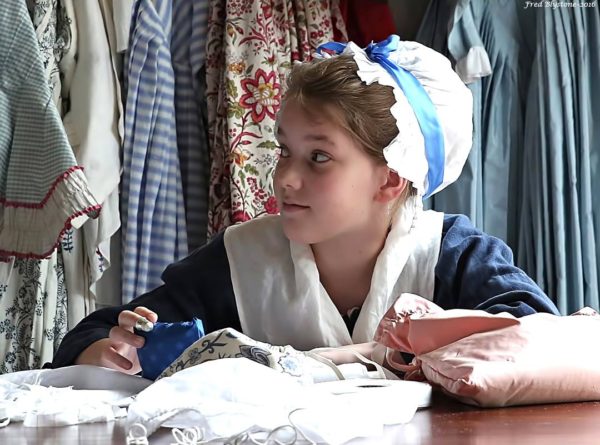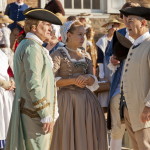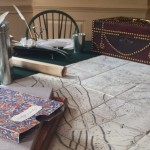
What can you learn from a kid? Plenty, if you happen to run across any of Colonial Williamsburg’s Junior Interpreters.
The JI’s, as they are commonly referred to, help the city come alive, especially during the summer, when their presence is most conspicuous. You’ll find them working in trade shops, demonstrating 18th-century dance, and playing games and interpreting daily life in sites like the Powell House and the Wythe House.
Guests often wonder just how these talented young people break into the interpreting game at CW.
It starts with an extremely competitive hiring process. The program is open to local kids and the children of Colonial Williamsburg employees between the ages of 11 and 18, who submit written applications during a winter expo, then interview for specific sites. Those accepted attend training sessions in the spring. The Costume Design Center issues their outfits, just as they would for any full-time costumed employee.
In all, there are approximately 120 JI’s. Each one typically works a few shifts per week in the summer, then occasionally on weekends and holidays through the school year. As volunteers, they aren’t paid, but they gain amazing experience. They develop great oral presentation skills, hand-eye coordination, and historical knowledge. They learn to communicate effectively with people of all ages and backgrounds. And they leave with stories that they’ll be telling all their lives.
Junior Interpreters also help the Historic Area look a little bit more like the 18th-century reality. A typical apprentice in a trade shop, of course, would have been a teenager, and children would have been found all over town.
Not every site has Junior Interpreters. They are based in places where they can effectively help tell our story. Each site has a detailed plan for how JI’s will be trained and utilized, and for how it contributes to our guests having a great time.
Extra caution has to be exercised for trade shops that would like to have young assistants. Safety is paramount, so shops submit the list of tools that a Junior Interpreter will be allowed to use. Each tool is demonstrated to a committee, which determines whether it is safe enough. Sometimes tools have to be taken off the list or a minimum age established for its use. One rule, for example, is that you have to be 14 to use a hand saw.
We asked some of our JI’s to share some of their experiences. Here’s what they had to say.
Danielle
Danielle just started at the Wig Shop, but she seems like a seasoned pro.
“I’ve always wanted to do this,” she says, recalling her mom making her a colonial costume to wear on visits years ago. That outfit was completed by a pair of modern bright red shoes, which didn’t escape the notice of one of the interpreters. Now, though, she is delighted to be decked out in an official ensemble.
Right now she’s working on making her own hairpiece—matched to her own hair color—from start to finish. The hairpieces are similar to modern extensions, and were commonly worn for formal occasions and, as they say in the shop, “when you wanted to feel fancy.” Danielle finished weaving hers a couple days ago, and now she’s binding the top of it. “Once I do that I’ll start styling it, and then I’ll be able to wear it.”
She enjoys sharing what she has learned about the trade and teasing people with beards by asking them if they’ve just come from the local jail. “And those weird facts that most people don’t know, like George Washington didn’t wear a wig. Or how we used human hair, not just animal hair, and that people shaved their heads when they wore wigs.”
Her parting advice? Go to the Raleigh Tavern Bakery and get the pretzel roll.
Jared
It’s another hot day, but Jared looks perfectly at ease under the towering tree that shades the Candlemakers’ spot next to the Joinery.
He says he’s perfectly comfortable. The fabric breathes, even if the clasps that secure the breeches at the knee are “like swords with buckles.”
In his first season as a Junior Interpreter, he’s been helping the candlemakers get established after their recent return as a trade.
“I’m loving it. Everyone is nice here, really laid back. I like dressing up in the 18th-century costume and interpreting and giving people insight on candlemaking.
Insight like the different types of wax, how to dip and mold a candle, and how many pounds in a pot of beeswax. Bet you didn’t know that it takes a hundred pounds of bayberries to get eight to ten pounds of bayberry wax.
He likes to help split wood, but the pace of that task has slowed a bit since much of the remaining supply has some serious knots.
As long as guests are having a good time, he’s happy. (Don’t miss the rifles and swords on display at the Governor’s Palace.)
“I’m really honored to have been picked to do this,” says Jared. “I love coming to work.”
Michaela
Michaela is in her sixth and final year as a Junior Interpreter, including the past two at the Powell House. She shares a sentiment that seems to be universal among the Junior Interpreters: she loves sharing history with guests.
“I’ve always loved history. To be able to be immersed in history is really nice. It’s really satisfying when you’re teaching children and you see the light go on when they realize, ‘This is history! This is America!’ It clicks.”
Illuminating family is the central purpose of the Powell House, which is located just east of the Capitol. “You get to see how you would live if you were the Powells, an upper middling family,” says Michaela. There are games, but also cooking and chores to be done. You’ll find them doing all of it. On this day Michaela was churning butter, among other tasks.
But don’t mistake the Powells for an average family. “Williamsburg is the capital of the wealthiest colony. People say, ’I’d love living in the 18th century. I say, ‘No, you wouldn’t!’”
Pere
Pere, also stationed at the Powell House, is in his first year as a Junior Interpreter, but he’s really an old hand. “I’ve been doing reenacting since I was seven weeks old,” he says.
Pere enjoys teaching kids all sorts of 18th-century games: Shut the Box, Battledore and Shuttlecock, Hoop and Stick, the thimble game, yard ball. Dolls and blocks for younger children. And tenpins or ninepins, depending on how many pins they have.
He has something to teach adults, too. “I like to tell them about the bedchamber and how it was bigger than most people’s homes, and they’re shocked because today many of them have bigger houses than the Powell House. The adults feel better about knowing where their life has come from.”
Pere recommends planning to spend some real time at the Powell House because the activities change every hour. “You get to see how the day worked.”
Eliza
Eliza is going into her senior year in high school. This is her seventh and final year, all spent at the Wythe House. “It’s fun. That’s why I’m still here after seven years. I know a fair amount about George Wythe and the property but I’m picking up new things every summer.”
At the Wythe, the Junior Interpreters primarily do science experiments and games.
“These games are a little harder than what we have today,” says Eliza. “If you don’t get the Bilbo catcher on your first try, it’s not the end of the world. The whole point of games in the 18th century was to take time and patience. Parents wouldn’t want to spend money on games their kids would get on the first try. Most kids would only have one or two games.”
After all these years, Eliza has gained a lot of volunteer hours and a wealth of experience. “It’s rewarding to interact with guests and to see younger kids as they pick things up. I remember when I was in their shoes.”
Anneliese
A visitor to the Wythe House—an adult—sits down next to Anneliese and asks her what she’s doing with the three glasses she seems to be intently studying. Each glass contains water and a single egg. She gets a so-glad-you-asked gleam in her eye, then asks him what he sees.
It’s the first of a series of questions as she successfully draws him into the kind of hands-on science experiment George Wythe would have loved.
A lot of people ask about her small round glasses, which are 18th-century reproductions. Not for show, of course. Interpreters can’t wear modern eyewear, so with Colonial Williamsburg’s help, she went out and purchased this pair. They’re a little bit uncomfortable, with the stems digging into her head sometimes, but small price to pay for historical accuracy, right?
She wants to make sure that we tell guests not to be afraid to ask questions. “We don’t bite, we’re actually pretty friendly!”
John
In his third year being an interpreter, John is balancing work with being a recruit in the Fifes and Drums. After two years spent exclusively at the Geddy House, he’s getting a new opportunity to interpret at the Wythe House.
John has been practicing his skills with the Bilbo catcher, where you try to make the ball at the end of a string perch on its wooden pedestal using just a flick of the wrist.
He says that kids seem to really like the Junior Interpreters. “We’re about their age level so I think they like to have us teach them instead of someone older.”
But sometimes it can be a challenge getting guests—of any age—to let go of their preconceptions and learn how things we’re done in the 18th-century way, so he urges people to keep an open mind. You may think you know how to play Mancala, but learn to do it the colonial way and you might like it.
And one more thing: That Hoop and Stick isn’t a hula hoop!
Elizabeth
Elizabeth is in her second year as a Junior Interpreter. At the Wythe House, she enjoys the unusual opportunities that come with the position, like doing science experiments.
She talks about how much she enjoys connecting with all the people she meets, learning and teaching and sharing information with people from all kinds of backgrounds. “People ask how you got into this. I remember riding my bike in the Historic Area and thinking about how fun it would be.”
There is a special camaraderie shared by the interpreters, as you might imagine. “One day it was really rainy and we just told riddles the whole day.” The Junior Interpreters learn a lot of history and gain some valuable skills, but they also make friendships that last a lot longer than a summer.


I have a son who might be perfect for this, but he has orthodontic braces. Would this inhibit his chances of being chosen?
I checked with Trish Barner, who coordinates our program, and she wrote: “We understand that some children that apply will be wearing braces, this will not interfere with his being chosen/not chosen at all. We have had several children that interpret with braces, but learn to work with their braces. Please have your son come to the next Expo to apply. You will need to watch the website and local papers for a date and time when one will be held, or you may contact Trish Barner (pbarner@cwf.org) in volunteer programs, to get on an email list”
Hope this is helpful!
I met an African American ji on my last visit to CW. Sorry I can’t recall his name. Frankly, I’m not sure how many African Americans, whether slave or free were in CW in the prtiod just before the Revolutionary War.
You raise an important point. African Americans actually constituted a majority of Williamsburg residents in that period. Most were enslaved, but they were a visible and important part of this community that we’re still trying to adequately represent. It’s a work in progress.
Over 50% of the population was African-American.
Patrick Cooperman says
So glad to see these young interpreters enjoying and sharing the fun of playing with the Rolling Hoops and Bilbo Catchers - just like the children of colonial Virginia. These are wonderful, traditional toys that stand the test of time and are well documented parts of colonial Williamsburg.. I applaud these young interpreters’ efforts and vision.
This is so cool! I’m so jealous of these kids. 🙂 I would’ve loved this as a teenager, but living in Ohio….sigh.
So what IS Anneliese doing with the eggs? Enlighten us, too!
I though someone might ask! It’s a simple experiment to show how the egg floats or sinks according to the relative density of the water. Each glass has a different quantity of salt.
It’s how you can test pickling brine!! 😊
OOOhhhhhhhhh! I thought it might be a way of checking whether the eggs were good or were spoiled! Thank you!
I am not typically a “political correctness” watchdog. My wife and I are big fans of the African-American interpretations that have come more and more to the forefront of CW programming. I couldn’t help but notice that there were no African-American Junior Interpreters featured in the blog. I would have found one or more of their stories interesting.
I assume there are some number.
I do think the JI program is a great one and it is a “win-win=win”. CW, visitors, and the kids all mutually benefit.
Jeff,
I appreciate your observation, and I’m sorry for any shortcomings in showing the diversity of our interpreters. All I can say is that I was able to speak with the kids who happened to be on duty when I visited various sites. I spoke with the coordinator of the program, and aside from assuring me of our efforts to foster diversity, she mentioned that the hiring for these positions is decentralized, so it wasn’t easy to tell me where to find any African American Junior Interpreters.
But thank you for sharing your thoughts. It’s a point well-taken.
Bill
All is well. As I said, I assumed there are African-Americans. I jus think that hearing from them would bring an added dimension. I would be intrigued as to how interpreting a person who is a slave, or free but limited in their possibilities would impact a young person. That probably be worth an article on it’s own. I believe there is a program done for visitors that allows interpreters of African-Americans to talk about their unique challenges. But all is well. I have been pleased by what I have observed of an increasing attention by CW to that aspect of life and society at the time..
Thank you. Just one clarification, if necessary. While our Junior interpreters in trade shops are portraying the crafts in a similar way to our tradespeople, JI’s in other sites like Wythe House are not assuming particular identities. So we would not have a young person portraying an enslaved person in that context.
Barbara Cataldo says
We met Danielle from the Wig Shop when we were there this summer. She was fantastic and most impressive! What a personality. she had. Danielle was very knowledgeable and didn’t miss a beat. When she told her stories or gave facts you couldn’t help but smile. We absolutely loved her humor.
I certainly agree! It was fun just to talk to them… about them.